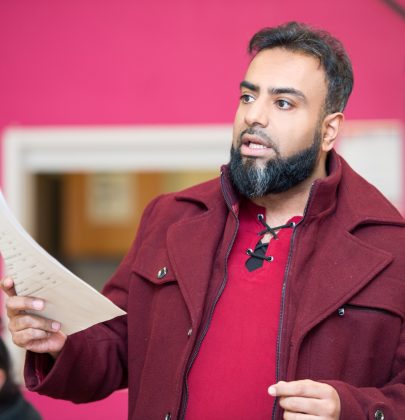
By Swarupa Tripathy
The curry industry in Britain is a vibrant sector and plays a significant role in the economy, with numerous restaurants, takeaways, and catering businesses presenting a range of choices to enthusiasts of South Asian food.
However, in the recent years, the UK’s curry scene has been in the midst of a crisis owing to staff shortages as well as rising costs, which many owners are now struggling to keep up with. What is even more concerning is the lack of female chefs and executives as the industry remains male dominated even after several decades of success.
Asma Khan, owner of all-female led restaurant, Darjeeling Express, says, “The whole idea is that this is an all-male club, where females are excluded, and if you do find females, you’ll find them in high end restaurants. Most of them tend to be pastry chefs in the cold kitchen. They work at a different shift pattern than from the normal kitchen. They’re never in positions of power. If you are not in a position of power, it is self-selection.”
Forbes characterises the absence of women in various roles as a “systemic problem”. Historically, the curry industry has been largely controlled and run by men, who have held the majority of important positions such as chefs, owners, and managers. This uneven gender distribution can be attributed to multiple factors, including cultural conventions, societal norms, and past influences.
One of the primary reasons for the underrepresentation of women in the curry industry is the cultural and societal expectations placed on women within certain communities. In many South Asian cultures, women are often expected to prioritise family responsibilities and household duties over pursuing a career outside the home. This has limited the opportunities for women from entering the culinary field and develop their skills in this industry.
Furthermore, the lack of visible role models and mentors for aspiring female chefs has played a significant role in discouraging women from pursuing careers in the sector. Without enough female representation at the top levels of the industry, it becomes challenging for aspiring women to envision themselves as successful professionals.
Poonam Ball, the Head Creative Chef of the renowned restaurant Madhu’s, has been vocal about this problem and champions the voice of women who are deserving to be at the top. “The industry is quite sexist,” she says. “When you ask a man, ‘What’s your favorite dish in the world? Who do you think cooks the best?’ It’s always, mum’s (cooking) of course.” She asks, “So why can’t mum then go into a commercial kitchen. Why do you need mum just to stay at home?”

There has also been a historical lack of support and recognition for women in the curry industry. This includes limited access to training and apprenticeship programs, financial resources, and networking opportunities. These barriers further contribute to the underrepresentation of women, as they face challenges in acquiring the necessary skills and resources to establish and grow their own businesses.
Yasmin Mahmood, Director of Oceanic Consulting, a renowned event management company which organises prestigious events in the UK including the Scottish Curry Awards, English Curry Awards and The Nation’s Curry Awards, among others, confirms that she has barely seen women come up on stage to collect their well-deserved trophies.
She says, “It saddens me to witness the glaring absence of women on stage at the events we organise. We need to break free from the shackles of a male-dominated culture and embrace the talents of women who have carved their own inspiring paths, but still remain largely unnoticed. A true representation of the exceptional women who make this industry thrive is much needed in today’s day and age.”
Founded in 1960, The Bangladeshi Caterers Association is a powerful organisation that represents 12,000 curry houses with a combined strength of 100,000 employees and £4.2 billion turnover. Interestingly, the body has never seen women in senior positions.
Staffing issues in the curry industry have been prevalent for many years now. The expenses of running curry houses across the country have increased owing to Brexit, the Covid-19 pandemic and the ongoing cost-of-living crisis. In an interview, popular entrepreneur, chef and politician Sarah Ali Choudhury talked about sexism being “rife” in the industry as the kitchen comprised only of men. She attributed this to the issue of staff-shortages that many businesses have been facing as well. She explained, “If you walk into virtually any Indian restaurant or takeaway you will almost certainly see just men working there. Ironically their wives are probably the best chefs they know but they are only allowed to cook at home.”
In addition to discrimination and stereotypes, women are reluctant to enter the industry as they fear the men will not understand some of their concerns. Mostly women are said to not be able to stay out and work late. Additionally those who are pregnant or are feeling unwell during their monthly menstrual cycles, often sense that their problems will fall on deaf ears.

Geeta Bhandari, the manager of award-winning Nepalese restaurant Da Mount Gurkha, opens up about her struggles. She has always worked hard, but could not back down from her responsibilities even when she was pregnant. She says it was “very hard because, physically, I was not very well and suffered from morning sickness”.
Bhandari believes it is essential that women in the industry are appreciated for their efforts. “There always has to be a start from somewhere to encourage others. Although there aren’t many women chefs, but the ones who are, should be appreciated and spoken about more. Then it can possibly motivate other women to join this field,” she suggests.
She considers herself blessed to have the support of her husband and her son, who have always pushed her forward, believed in her abilities as a manager and guided her through tough times. She confirms that this kind of trust from them made her feel “powerful”. “If the family members support the woman, she can do anything.” She adds, “But we need that support from our husband and kids.”
When asked why the chances of women being recruited are so low, Poonam Ball says, “The mindset is that she’s not strong enough, she can’t do the hours or she’s going to get pregnant. All of these things are in the employers’ minds when a woman will come up for a job.” She agrees that the support she has received from her brother, Sanjay, as well as from her husband and kids, have played a big role in making her one of the most successful and well-respected chefs today.
Despite still being a largely male-dominated industry, changes are being made. Many women, who have struggled yet managed to reach the top of the field, have made it their mission to support other women so that they won’t have to endure outright misogyny that prevails within the UK’s curry industry.

One such person is Zaitoon Salamat of Desi Dhaba Chaiwala. Set up by her father, she says that over the years, she has taken over the quaint Glasgow restaurant after he decided to take a step back. Since then, Salamat has taken the courageous step of employing an all-female workforce and is proud of them as she believes that it is their hard work and dedication that have made the business successful. “We’re not even asking for anyone to go easy on us, because women work very hard to get to where they are. We just need society to treat us with a little more equality and understanding,” she says.
Her policy when it comes to treating her staff is starkly different from the norm. She adds, “We know if you’re a mother, you are going to have other commitments, and I would never expect a mother working on my team to forsake her children or her family to come and earn for me. These things would never go against them.”
Asma Khan, who is a world-renowned chef and cookbook author says, “My restaurant is an extension of my home, a celebration of women from South Asia. Not just India, from Afghanistan to Sri Lanka, we’re celebrating all women in South Asia who have been the nourishers of generations. So, that’s what my restaurant is.”
However, it is crucial to highlight that there have been efforts to address this gender disparity in recent years. Several restauranteurs, organisations, initiatives, and campaigns have emerged to promote and support women’s participation in the curry industry. These initiatives focus on providing training, mentorship, and financial assistance to aspiring female chefs and entrepreneurs.
Celebrity chef and author Dipna Anand of the popular Brilliant Restaurant in Southall, says that when she first set foot in the industry, she remembers “it being a lot more male dominated back then than it is now”. She agrees that the perception of only men taking on the role of chefs in commercial kitchens has carried on for a long time; which is why she motivates women “to pursue the career in this kind of industry because it’s one of the best industries”. She says they need a little “push”, more female role models and unconditional support from the people closest to them.
Undoubtedly, promoting an inclusive and supportive environment is imperative as this helps break down barriers and biases that have hindered female participation for a long time. By tapping into the underutilised potential of female talent, the industry can diversify its workforce and ensure a bright future. Increased female representation brings in new talent, fosters innovation, enhances the customer experience, creates a more inclusive and supportive industry, and helps the industry to tackle other issues such as staff or talent shortages. By breaking down gender barriers and ensuring equal opportunities, the curry industry can unlock its full potential and thrive in the long run.








